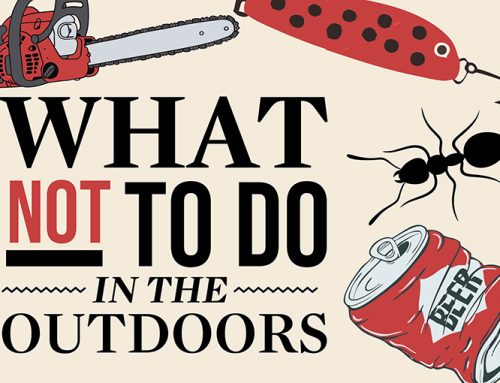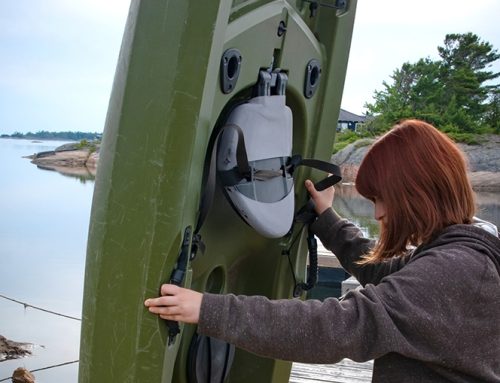
There’s no period as critical to a gun dog’s development as that first week with its permanent owners. It’s at this impressionable stage that you have an excellent, albeit short, window to jump in as its leader, protector, and provider. The most important thing to remember, from the first moment you pick up that little wiggling ball of excitement, is to start as you want to finish.
Inside-the-box thinking
Many problems that people experience in raising a pup can be directly tied to under-using or not using a crate or kennel. Dogs are naturally predisposed to be den animals. Providing a place where a dog can find peace and comfort is the cornerstone of good puppy development. I use a kennel cover with ample pockets so I can keep all my puppy gear, such as paper towel, vinegar water for cleanups, and leashes, all in one convenient package. This way, I can easily take it and the pup wherever I go. In doing so I’m constantly building that bond with the puppy.
Coming home
I strongly urge you to purchase a kennel or crate before you pick your pup up from the breeder. That way, the first trip the pup takes in a vehicle is in a crate. Every time the puppy goes for a ride, and that should be as often as possible, it will expect to travel in a crate. Before long, it will associate the crate with new experiences and adventures and be only too happy to jump right in.
For crying out loud
Puppies can be vocal. Constant crying, whining, and barking get old fast, but jumping to address every whimper can cause problems. One must exercise restraint in order to teach the pup when a whimper is justified and when it’s annoying. In short, when all of a pup’s needs have been addressed and you have determined that it’s just looking for some extra attention, or to be released from its crate when it is not convenient to do so, the best course is to simply ignore the vocalisations.
House training
As I mentioned, a dog properly introduced to its kennel will look at it as its own space and will be inclined to keep it clean. The fastest way to complete house training is for you to be aware of your dog’s elimination of waste and to praise or scold it consistently and immediately. Whenever you are unable to pay full attention to the pup, it should be kenneled. This way, it won’t be able to get away with any clandestine transgressions on your carpets or hardwood floors and it will resist doing so in its own den. It’s important, however, to have reasonable expectations of a puppy’s capabilities. Take it outside immediately upon letting it out of its crate, and praise it when it does what’s expected.
Being chewzy
Young pups, like children, are curious and want to chew just about anything they can get their mouths on. Puppies chew for several reasons, although teething seems to be most common. All you can really do about this is direct the impulse to chew to a few allowable safe items. I recommend chew toys that are tough and will show up on an x-ray if a small piece is swallowed. Kong dog products produces a durable chew toy that is available at most pet supply stores, and there are lots of other toy options. However, retrieving bumpers should be avoided as chew toys and used only for retrieving training. The chew toy is the dog’s and the retrieving bumpers are yours and should be treated as such by the pup.
Cute immune
Let’s face it, puppies of all breeds are just plain cute. It’s been said that the reason God makes puppies so cute is to create a buffer zone of adorableness that protects them from our frustration as they develop into dogs. I’m not trying to convince anyone to ignore the innate cuteness of a puppy, an almost impossible task, but you’ll do well to keep your eye looking towards the day when it’s a fully-grown and fully-trained gun dog.






good article… could have brought in how to keep the pup from goin gun shy though
when my pup was 10 weeks old we started banging off rifle primers before play retrieving when 4 mos old shot guns load noises thunder doesn’t even
fizz
I put tools in a tool box. However, a dog is not simply a tool you can put away, but a companion and a highly social pack animal and not something that should be locked up out of sight. You might have had different intentions when you wrote this; however I bet there are quite a few people who read the following differently:
“Dogs are naturally predisposed to be den animals.”
“…looking for some extra attention…the best course is to simply ignore”
“are unable to pay full attention to the pup, it should be kenneled”
You say: “Many problems that people experience in raising a pup can be directly tied to under-using or not using a crate or kennel.” A dog is not born with a crate; hence, they don’t need one! IMHO they are very much over-used in our nowadays busy society by people who get a dog and don’t have the time needed for the dog. I do, however, agree with you on this one: ”The most important thing to remember, from the first moment you pick up that little wiggling ball of excitement, is to start as you want to finish.” Maybe you should have elaborated a bit more on that part!